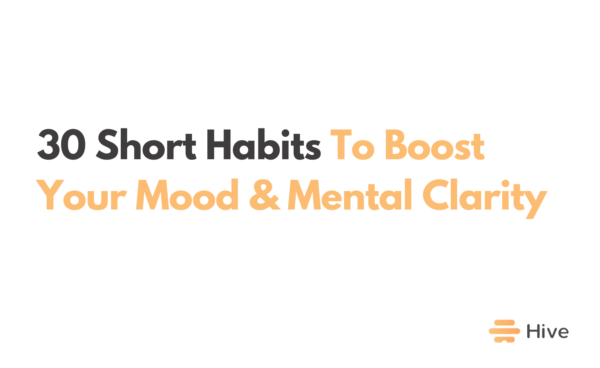The world is constantly buzzing with activity. From the minute you get up in the morning until you go to bed, it’s a never-ending series of information, tasks, sounds and sights.
When we are exposed to so many stimuli, our brains must simultaneously process them to keep us calm and relaxed. When things become too chaotic for our brains, we feel stressed out. This stress response can cause physical symptoms and negative emotions like anxiety.
In our busy modern world, it’s easy to get caught up in an endless cycle of stress, anxiety, and frustration. If you feel lethargic and unmotivated regularly, it might be time to deliberately change your habits.
You need to boost your mood to attain better mental clarity. You can change your habits on purpose to make yourself happier.
The easiest way to improve your mood is to make it a priority. That means setting aside time every day for you, whether it’s an hour or half an hour, and scheduling things around that time.
While there is no “quick fix” to improving your mood, mental clarity and total well-being, there are a host of psychological life hacks that can improve your mental state.
-
Start by taking note of your daily routine: when you get up, what do you do first? When you go to bed, what do you focus on before falling asleep? Do these things trigger positive emotions or memories that make you happy?
-
Almost all suffering happens in our minds. Be careful of the stories you tell yourself about anything. “The greatest weapon against stress is our ability to choose one thought over another.” — William James
-
Learn to be comfortable with uncertainty. Life will always throw curveballs and unexpected situations; be ready for them.
-
Build a positive relationship with yourself. If you’re constantly putting yourself down, it will be difficult for you to feel good about yourself.
-
“The more you know yourself, the more patience you have for what you see in others.” — Erik Erikson
-
When under pressure, think of things that are going well instead, and build on those successes instead of dwelling on what could be better.
-
Move for your mind. Walk, jog, or run. It can quickly improve your mood and increase mental clarity.
-
Learn what makes you happy and repeat them on purpose. Appreciate the things that bring out the best in you.
-
Don’t assume the worst all the time. Look for small wins and opportunities for growth. Catastrophic thinking can easily derail your mood.
-
Surround yourself with upbeat people. The simple act of spending time with happy people can create a ripple effect in your own mind.
-
“We cannot change anything until we accept it. Condemnation does not liberate, it oppresses.” — Carl Jung
-
Find and do something you are curious about outside work that can boost your happy hormones — anything activity that helps you relax.
-
Create a playlist for work and exercise. Listening to the right music at the right time changes your response and reaction is ways we don’t understand yet.
-
Mental energy is finite — take good or quality breaks often to recharge.
-
Be more aware of your emotional state in any situation- from happiness, stress, misery, anger, fear, and embarrassment to love. It will help you better understand why you might be acting a certain way.
-
Declutter your physical space to improve your mental space. “Discard everything that does not spark joy.” — Marie Kondo
-
Be more mindful of your surroundings and what’s going on around you. It increases feelings of empathy and connection with others.
-
Talks less — listen more. You will learn more, understand others better, dig deeper into how people think and engage with people easier.
-
Stay in touch with friends and social connections who make you come alive — your happiness depends on it. Call an old friend. It can quickly provide a big boost to your mood.
-
“The primary cause of unhappiness is never the situation, but your thoughts about it. Be aware of the thoughts you are thinking.” –Eckhart Tolle
-
In suffering, be more compassionate with yourself. Don’t be judgemental when you are afraid, confused, sad, upset or make a mistake.
-
Schedule “worry” time — preferably at the end of your day. For every worry, if it’s within your control, write down how you can solve it.
-
Beware of poor sleep hygiene. You are more likely to be irritable and anxious throughout the day if you don’t get quality sleep.
-
Be more observant. Notice small miracles of nature around you.
-
Stop holding on to anger and resentment. If people disappoint you, forgive them and move on. Don’t hold on to bitterness — it won’t help you feel good about yourself.
-
Enjoy your favourite beverage at your favourite coffee shop. Make it a quality break away from tasks. Just sit and enjoy.
-
Find and manage your stressors. Instead of focusing on your stress, find everything that causes the stress and reduce them. That’s how you minimise stress.
-
Seek sunshine. Appreciate sunrise and sunset. Vitamin D is linked to better mental well-being.
-
See even more green. Try a forest bath (a simple Japanese process of relaxation). Calm and quiet amongst the trees can do wonders for your mind and mood.
-
Beware of negative influence. “Spending time with negative people can be the fastest way to ruin a good mood.”— Amy Morin
This article originally appeared in Medium.





